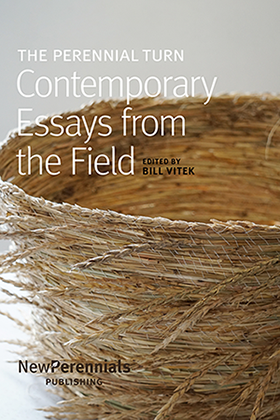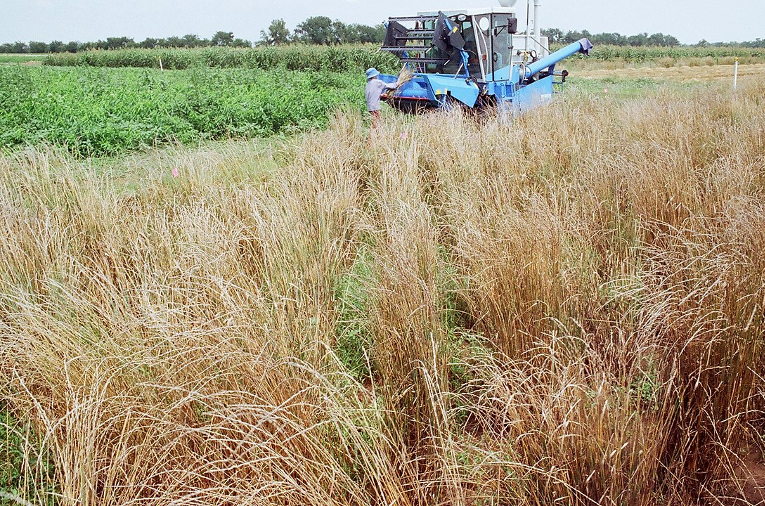 Ed. note: This piece is the first contribution in the new book The Perennial Turn: Contemporary Essays from the Field, ed. by Bill Vitek and published as a free ebook by New Perennials Publishing. The essay is written by Wes Jackson, Aubrey Streit Krug, Bill Vitek, and Robert Jensen.
Ed. note: This piece is the first contribution in the new book The Perennial Turn: Contemporary Essays from the Field, ed. by Bill Vitek and published as a free ebook by New Perennials Publishing. The essay is written by Wes Jackson, Aubrey Streit Krug, Bill Vitek, and Robert Jensen.
For those who are willing to face the multiple, cascading crises that humans have created, one task is analysis: How did we get here? In the 200,000 years of Homo sapiens, what have been key thresholds of systemic change?
A good case can be made for agriculture, which the polymath scientist Jared Diamond (1987) called “the worst mistake in the history of the human race.” Three decades later, historian Yuval Noah Harari (2015, p. 77) called the Agricultural Revolution “history’s biggest fraud.” When we started taking control of animals’ lives and breaking the soil to produce energy-rich grain, we intervened in ecosystems in ways we could not predict or control, to the detriment of many organisms, including humans.
With nearly eight billion people on the planet, we aren’t going back to hunting and gathering. But around the world, often under the banner of agroecology, people are using modern science and traditional knowledge to develop ways of farming that are less ecologically and socially destructive.
Over the past four decades, one of the most promising projects in sustainable agriculture has been Natural Systems Agriculture (perennial grains grown in mixtures rather than annuals grown in monocultures) at The Land Institute. The institute’s Ecosphere Studies program nurtures and explores this perennial thinking through research and education based in an ecological worldview that challenges the dominant industrial model defining contemporary ways of feeding bodies and minds. This essay outlines our approach, including a diagnosis of our agricultural past and present in a broader ecospheric context, which resonates with other ecocentric projects while building on the lessons learned on the Kansas prairie that is home to The Land Institute.
The history: The 10,000-year problem of agriculture
When humans began to generate surpluses by domesticating plants and animals about 10,000 to 12,000 years ago, a conceptual split between “culture” and “nature” emerged, with human culture assumed to be separate and privileged. This domination/subordination relationship—humans claiming dominion over the world—also came to define relationships within the human family. Social hierarchies—organized around such statuses as sex/gender, class, race/ethnicity, and national citizenship—structure most societies today and influence the control of surpluses. Deep disparities in wealth and power are the norm within and between contemporary human societies.
Humans’ depletion of soil and other resources intensified with industrialization. Ongoing imperial and settler-colonial structures, ideologically justified as advancing “civilization,” have been particularly dependent upon material scaffolding from the five relatively nonrenewable sources of carbon: soil, trees, coal, oil, and natural gas. Highly dense fossil-carbon energy and the advanced technology used to extract and process resources have destroyed local wisdom by reducing whole ecosystems to inanimate parts, leading to crises that affect essentially all ecosystems.
The conceptual shift: Earth alive!
Moving from a human-centric to an eco-centric perspective begins with a critique of the living/dead dualism. J. Stan Rowe (2003) suggested imagining that inside a cell it might appear there are some moving/living parts and other non-moving/non-living parts. But from an outside view, the whole cell is seen as living, the result of the participation of all components.
Viewing “life” only as a property of organisms has led some humans to treat the planet as a mine from which to extract resources and a dump into which to discard wastes, rather than as a home to care for. Viewing humans as supreme among creatures has led to the instrumental treatment of fellow organisms. What is “dead” or “not-human” is deemed relevant only to the extent it can be exploited for human use.
Earth’s atmosphere, lithosphere, and hydrosphere are not separate from the biosphere but essential parts of a living whole—the ecosphere, our foundational unit of analysis. Because of the priority of the ecosphere over humans (in time, inclusiveness, complexity, evolutionary creativity, and diversity), the ecosphere is a proper “boundary of causation” (understanding the complex forces that create our world) within the cosmos. At the next level down in the hierarchy of structure, ecosystems become the primary focus for human investigations, as the “boundaries of consideration” (the scope of what humans reasonably can, and should, pay attention to).
What knowledge and practices are needed to create and maintain stable and just communities that can remain in a sustainable relationship with our ecosphere? The Land Institute’s mission statement emphasizes, “When people, land, and community are as one, all three members prosper” (The Land Institute, n.d.). We hold this to be a truth that must become self-evident: Our shared human responsibility is to live on, not dominate, our home planet.
To address the social-ecological trauma of agriculture and the industrial world, we must voluntarily live within biophysical limits to make possible a post-growth, sunshine-powered future. We must evaluate human systems and projects not by short-term productivity for humans but by the long-term flourishing of ecosystems, including people.
The process: Driving knowledge out of its categories
This requires that we integrate insights from all academic disciplines—core sciences, applied sciences, engineering, social sciences, humanities, the arts—and recognize the value of disparate ways of knowing, from modern to indigenous/traditional perspectives.
We don’t reject reductionist science completely but promote caution and greater awareness of the emergent properties of complex systems. If the scale is small enough, a graceful backing out of our messes—created from the inevitable unintended consequences of our actions—is more likely. The scientific method remains our best hope to turn away from unsustainable practices if we think rigorously and act with humility. The analytical expression of knowledge produced by science must be both challenged and complemented with artistic and spiritual inquiry, always with history as a guide.
Given the damage humans have done to ecosystems, we cannot assume human knowledge is adequate to control the world and should adopt an “ignorance-based worldview” (Jackson, 2005). Because we are always far more ignorant than knowledgeable—a fact captured in the truism, “The more you know, the more you know you don’t know”—we must become better students of exits, looking for the soft landings necessary when knowledge-based plans go awry.
Eco-social knowledge will be attentive to the ecological realities that shape culture, politics, and economics. Human creativity, expansive as it has been, cannot transcend biophysical limits for long and is always subordinate to the creativity of the ecosphere. Arrogance in the short term reduces options in the future.
Driving knowledge out of its categories—learning from, but transcending the boundaries of, academic disciplines—can be fostered by bringing together scholars, activists, teachers, and students to pursue collaborative research and to learn through experimental and experiential workshops. To address how young people are socialized into an extractive worldview in ideas and resources, we seek a transformation of education and economy—of ways of thinking and making a living.
Natural Systems Agriculture is a model for moving forward deliberately, rather than waiting for collapsing ecosystems and chaos. Growing plants with deep roots in a diverse community suggests a model for human communities. Instead of rootless modern life that incessantly strives for upward mobility, a perennial culture would encourage communities rooted in a place but capable of dealing with inevitable change—places where difference will generate tension and conflict but ultimately build strength and resiliency.
The practice: The human estate of grief and joy
Revolutionary change in theory and practice, not minor course corrections, are needed; we cannot assume that modifying the existing trajectory of the human species is adequate. If there is to be an ongoing large-scale human presence on Earth, the energy/resource consumption that most affluent humans take for granted—and which many non-affluent humans aspire to—cannot continue. We reject fantasies of unlimited growth.
Conventional thinking naïvely asserts we can solve these problems with increasingly sophisticated technology powered by renewable energy (Cox, 2017), but such “technological fundamentalism” is a dead end. Rather than pretending to solve the problem of maintaining the current population or affluent consumption patterns, Ecosphere Studies imagines a different world, without guarantees but with foundational ideas consistent with an ecologically tuned future.
Since agriculture began, humans have become a species out of context, with many of us living in arrangements far beyond the scale in which we evolved, requiring us to work far beyond the scope of our competence. We cannot return to a pre-agricultural past, and we can no longer pretend that technological miracles will secure our future. We must reconsider our quest for surplus and the domination/subordination dynamic that arises out grain agriculture’s generation of surplus.
People are imagining such satisfying futures, but it is naïve to ignore the grief that we will experience. Humans have always lived, as Wendell Berry (1996, p. 106) put it, on “the human estate of grief and joy,” but the accumulated harm of the past 10,000 years means we face a grief that will be unprecedented in human history.
Our best course embraces the joy and refuses to turn away from the grief.
REFERENCES
Berry, W. (1996). The unsettling of America: Culture and agriculture (3rd ed.). Sierra Club Books.
Cox, S. (2017, November 9). Renewables alone won’t save us. Dissent. www.dissentmagazine.org/online_articles/100-percent-renewable-energy-overconsumption-inequality
Diamond, J. (1987). The worst mistake in the history of the human race. Discover Magazine. discovermagazine.com/1987/may/02-the-worst-mistake-in-the-history-of-the-human-race
Harari, Y. N. (2015). Sapiens: A brief history of humankind. HaperCollins.
Jackson, W. (2005, Spring). Toward an ignorance-based worldview. The Land Report, 81, 14–16. https://2hyzup3gkq37nm98l33j3iwt-wpengine.netdna-ssl.com/wp-content/uploads/2018/05/101992-LR-81.pdf
Rowe, J. S. (2003). The living Earth and its ethical priority. The Trumpeter, 19(2). www.ecospherics.net/pages/Roweliving.htm
The Land Institute. (n.d.). Mission statement. landinstitute.org/about-us/vision-mission
Teaser photo credit: By Dehaan – Scott Bontz, CC BY 3.0, https://commons.wikimedia.org/w/index.php?curid=5181663





